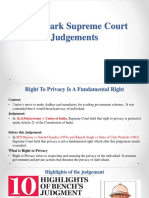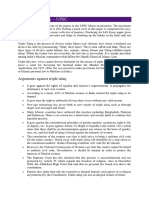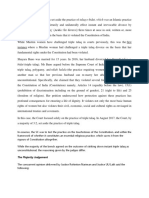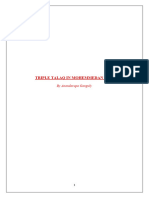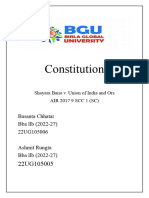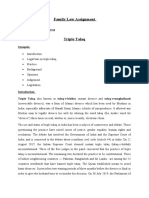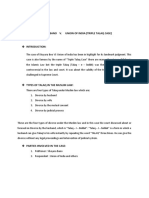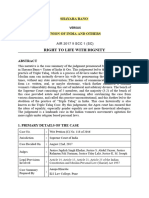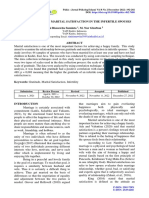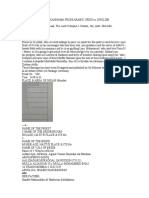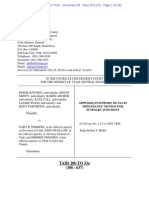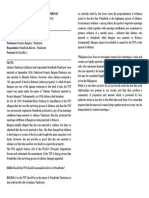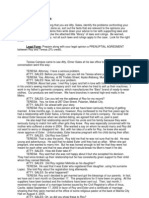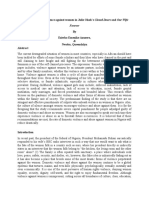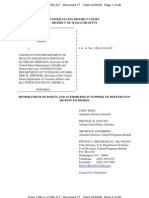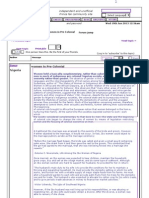Triple Talaq Issue
Triple Talaq Issue
Uploaded by
Rajesh PatibandlaCopyright:
Available Formats
Triple Talaq Issue
Triple Talaq Issue
Uploaded by
Rajesh PatibandlaOriginal Description:
Original Title
Copyright
Available Formats
Share this document
Did you find this document useful?
Is this content inappropriate?
Copyright:
Available Formats
Triple Talaq Issue
Triple Talaq Issue
Uploaded by
Rajesh PatibandlaCopyright:
Available Formats
MAINS 2017 CURRENT AFFAIRS
GENERAL STUDIES -1
TRIPLE TALAQ ISSUE
Many social practices that reflect social inequalities hide behind the cover of religion.
Personal laws, under British administrators were drawn from diverse sources. It
reflected the gender prejudices of its times since the interpreters of “religion” have
been mostly men. The process of reforming regressive practices also began during
the British rule. Reformers ended practices like Sati and child marriage. Conservative
sections in the society opposed these reforms and insisted that these be preserved in
the name of “defense” of religion.
This has been an issue of concern for over 65 years for Muslim women, who comprise
approximately 8% of the population as per the 2011 census. Muslim women want to
have a life equal to that of another woman, say a Christian or Hindu wife.
BACKGROUND OF THE ISSUE --TRIPLE TALAQ
THE SHAH BANO CASE
In 1985, Shah Bano sociology postgraduate and a mother of two appealed that triple
talaq should be declared unconstitutional when her husband ended their 15-year-old
marriage by sending her a letter with the word talaq written on it thrice. Under pressure
from the Muslim Personal Law Board and with one eye on vote-bank politics, Rajiv
Gandhi government surrendered to the religious leaders and enacted a law that did not
allow Shah Bano to receive the alimony (monthly maintenance) from the husband who
had divorced her. In the Shah Bano verdict, three decades ago, no major party stood
up for the rights of these women nor had they challenged the right of qazis or religious
leaders to certify divorces. She has argued that divorce is a civil-rights issue and only
courts should have jurisdiction to adjudicate them.
ALLAHABAD HIGH COURT VERDICT
In a boost to the case against triple talaq, the Allahabad high court has observed that
the practice of instant divorce is unconstitutional and violates the rights of Muslim
women. The court further emphasized that no personal law board is above the
Constitution and hence personal laws of any community cannot claim supremacy over
constitutional rights granted to individuals. This is a welcome observation that upholds
the principle of equality and gender justice. Contrary to the claim of the All India Muslim
Personal Law Board, the practice isn’t essential to Islam. Neither does it enjoy universal
acceptance since most petitioners against triple talaq are Muslim women.
TRIPLE TALAQ AND ITS EFFECTS ON MUSLIM MARRIAGES
Discriminatory practices like Triple Talaq should go not only because they go
against the Quran or many Islamic countries have done away with them but they
must go because they violate democratic rights guaranteed by the
Constitution.
Many women have undergone severe trauma after being thrown out of their homes.
In practice, the rights of Muslim women are being subverted in the name of rights
guaranteed to minorities by the Constitution.
NEO IAS 0484-3190310, 9446331522, 9446334122 Page 1
www.neoias.com | www.youtube.com/neoias | www.facebook.com/neoias | www.twitter.com/neoias
The issue is not whether a religious community has the right to live by its holy
laws but whether any community has the right to live by rules that subvert the
rights guaranteed to every citizen in the Constitution. Hence the move is a
positive sign because Muslim men and women have stepped into an area that was
until now the preserve of only activists.
Among Muslims, it seems the triple talaq provision has pushed up the share of
female divorcees to 5 per 100 compared to 2-3 per thousand for Hindus, Sikhs and
Jains according to freshly released Census 2011 data. A complex web of religious
and social factors is responsible for these trends, which are similar to those
discovered in the previous Census. Although divorce is legally allowed for Hindus,
it may still carry social stigma. This could be the reason why the separation rate for
Hindus (unlike Muslims) was 5.5 per thousand married people, while the divorce
rate was pegged at just 1.8 per thousand.
According to the verdict, personal laws of any community cannot claim
supremacy over the rights granted to the individuals by the Constitution that
provides for equality and non-discrimination.
Women cannot remain at the mercy of the patriarchal set up held under the clutches
of sundry clerics having their own interpretation of the holy Quran. Triple talaq has
been deprecated and not followed by all sects of Muslim community in the country
and thus Muslim women continue to suffer bias.
PERSONAL LAWS
Most people believe that we do not have common civil laws in this country. The reality
is, all civil laws are common, except one law, namely the personal law which
varies with the religious groups. The personal law relates to marriage, divorce,
succession and inheritance, maintenance, custody of children and adoption. By
tradition, the personal law is treated as religious, though religion has nothing to do with
it. Personal laws have always been manipulated to preserve traditional male privileges
by institutionalizing discriminatory characteristics and gender-unequal interpretations
of major religious traditions. Thus, all personal laws, whether based on Muslim, Jewish,
or Hindu laws, constructed through male-centric readings of sacred texts and traditions,
which heavily discriminate women in familial matters such as marriage and divorce.
They are inconsistent with the egalitarian principles in CEDAW (Convention on
Elimination of All forms of Discrimination Against Women, 1979) and also the
Indian Constitution, which prohibits the State from discriminating against women as a
class.
In case of Triple Talaq issue, neither does the Quran sanction this form of divorce nor
was it legally held permissible by the Constitution. Such a practice violates the
fundamental principles of gender justice, gender equity, good conscience and
the dignity of women strongly enunciated in Islam.
There is no doubt that all personal laws have to be just and equitable to both men and
women and, hence, the good from all personal laws has to be accepted and the bad to
be discarded. Hence the uniform code, if and when enacted, will have to be a different
one from the personal laws of all religious communities. It will have to be framed by
consensus among all the religious groups and will have to conform to the norms
NEO IAS 0484-3190310, 9446331522, 9446334122 Page 2
www.neoias.com | www.youtube.com/neoias | www.facebook.com/neoias | www.twitter.com/neoias
of modern values of freedom, equality, rationality, justice and humanism, for
both men and women.
CRITICISMS FROM OTHER COUNTRIES
Needless to say Talaq-i-bidat has devastated the lives of many women and children.
Deprived of any opportunity for settlement, this mode of divorce has been subject to
criticism in several Muslim countries and have brought about reform through
codification. Countries like Turkey, Tunisia, Syria, Egypt, Morocco, Iran, Iraq,
Malaysia, Indonesia and Pakistan have either reformed the law completely or
brought about legally stringent preventive measures in this area. If Muslim countries
can bring about reform in family laws India must follow suit.
TRIPLE TALAQ: THE HISTORIC VERDICT
A five-judge Constitution bench of the Supreme Court ruled that the practice of
instant Triple Talaq is unconstitutional and against the teachings of Islam. The
bench headed by Chief Justice of India, Justice J S Khehar ruled against the practise
by a majority of 3:2. Besides seeking a ban on instant triple talaq, the seven petitioners
that comprise five Muslim women had also moved the apex court over the practice of
nikah halala and polygamy in the community.
DIFFERENT INTERPRETATIONS
In one common judgment, two of the five judges (Rohinton F. Nariman and U.U. Lalit)
held that triple talaq was an element of statutory law — the Muslim Personal Law
(Shariat) Application Act, 1937 and, being arbitrary, was unconstitutional.
However, Chief Justice J.S. Khehar and Justice S. Abdul Nazeer held that the practice
of triple talaq, being a component of personal law, was protected by Article 25 of the
Constitution and could not be interfered with by the court. In the same breath they
directed that this practice be abrogated by Parliament through legislation.
Justice Joseph holds triple talaq to be inoperative not because it violates fundamental
rights, but because it is, on his reading, “Anti-Quran” and hence violative of the Shariat.
Whatever else one might read into the decision, it is clear that three judges of the
Shayara Bano v. Union of India case did not come to the determination that triple
talaq is gender discriminatory and hence unconstitutional — the very question
that they were tasked with answering.
By a majority decision, instantaneous triple talaq is now invalid is a significant victory
that is the result of many decades of struggle by the Muslim women’s movement for
gender justice. That is something that must be welcomed. However, the value of a
Supreme Court judgment lies not only in what it decides, but also in the
possibilities and avenues that it opens for the future, for further progressive-
oriented litigation. In that sense, the triple talaq verdict is a disappointment,
because even the majority opinions proceeded along narrow pathways, and avoided
addressing some crucial constitutional questions.
NEO IAS 0484-3190310, 9446331522, 9446334122 Page 3
www.neoias.com | www.youtube.com/neoias | www.facebook.com/neoias | www.twitter.com/neoias
Therefore, in a case that involved, at its heart, issues of the intersection between
personal law, the Constitution, and gender discrimination, there is no majority
view on any of these topics.
ROLE OF WOMEN AND WOMEN ORGANISATIONS
Some 50,000 Muslim women and men signed a petition asking that the practice of
talaq- i- biddat (triple talaq) whereby the husband can dissolve the marriage by
pronouncing talaq three times, in the presence of at least two persons, and not
necessarily in the presence of the wife must be banned, along with polygamy as these
practices goes against the sanctity of marriage. It was further supported by NISA (a
women organization in Kozhikode) seeking to declare sections in the Muslim
personal law dealing with the practice of triple talaq, polygamy, nikah halala (bar
against remarriage with divorced husband without an intervening marriage with another
man) and inequality in intestate succession (a person who has died without
having made a will) as unconstitutional.
The petition also argued that practice of Muslim men being permitted to have up
to four wives was unfair. It also stated that the succession rules in Muslim personal
laws grossly violated the right to equality as it specified that if a Muslim man died
leaving behind only a daughter, she has to share the property with father’s brothers
and sisters while such is not the case when the deceased is survived by an only son.
It was brave of Shayara Bano, Ishrat Jahan, Aafreen Rehman, Gulshan Parveen and
Atiya Sabri to petition to India’s apex court against instant triple talaq, because it meant
going against powerful male authorities in the community. But its euphoria is tempered
by ground realities, where reform will take more time and enlightenment. Over in
Kolkata for example Ishrat Jahan is battling a social boycott. The SC verdict has
opened floodgates of expletives against her: like gandi aurat (dirty woman), enemy of
men, un-Islamic. Her lawyer Nazia Ilahi Khan is being trolled online. But even as Ishrat
is learning that the court judgment will not change society by itself, she is refusing to
get dispirited. She has decided to remove her niqab, to say to other women that
she is not a victim anymore and every ordinary woman can fight for her rights
like her, to push for change within the community.
Bharatiya Muslim Mahila Andolan (BMMA), a Muslim women’s advocacy group, also
launched a campaign against triple talaq, which the organization said had no
sanction in the Quran. A survey done by BMMA shows around 92% Muslim women
are against to this abominable practice. Moreover, BHARTIYA MUSLIM MAHILA
ANDOLAN (BMMA) was one among the five petitioners on whose plea the Supreme
Court invalidated the practice of instant triple talaq (instant divorce) or talaq-e-biddat
wherein a Muslim man could divorce his wife by pronouncing talaq thrice in one go.
RELIGIOUS DIMENSION OF THE VERDICT
The unilateral triple talaq, which Muslims are made to believe is based on divine
revelation, is nothing but a legal evasion devised by an acquiescent Muslim clergy at
the behest of the Omayyad monarchs. This happened during the second century of the
Muhammadan era much after Prophet Muhammad had passed away. It was done to
bypass the true triple talaq as formulated in the Quran.
NEO IAS 0484-3190310, 9446331522, 9446334122 Page 4
www.neoias.com | www.youtube.com/neoias | www.facebook.com/neoias | www.twitter.com/neoias
Gender justice is a central tenet of the Koran and gender inequality and triple
talaq are in violation of the Koranic principles. In fact, in the Koran, the very
conception of humankind is based on an equal footing between man and woman. The
true triple talaq, as ordained by the Holy Quran, is one of the more humane therapies
to deal with a downward spiraling marital relationship. Importantly, the most significant
injunction in the triple talaq therein is that after each pronouncement of talaq, there has
to be compulsorily a period of waiting or iddat that provides a timeout to reflect on the
alternatives to a divorce.
Therefore, the instant triple talaq as permitted by the Muslim personal law not only
negates the road map of the true triple talaq laid down in the Quran but also gives
Islam a bad name. Hence, as the heretical triple talaq is sanctioned neither by the
Quran nor by the Prophet’s precepts, it would be legitimate to remove it from the Indian
laws and abide by the one and only true triple talaq as set out in the Quran. Only this
talaq should continue to remain as part of the Muslim personal law.
SOCIAL DIMENSION OF THE VERDICT:
The Supreme Court's majority verdict declaring triple, or instant, talaq unconstitutional
is an important, albeit limited, victory for Muslim women in India. It aligns India's Muslim
personal law, in this regard, with the law in most large Islamic nations that have already
outlawed triple talaq, including Pakistan and Bangladesh. It opens the door for a
serious engagement towards creating a civil legal code based on the principle of
equality.
For women of Muslim faith in this country, the judgement marks a first important step.
But there is still a long way to go. The judgement focused on a single issue, the triple
instant talaq, or talaq-e-biddat, a frequent method of divorce among Sunni Muslims in
India. It does not address issues like polygamy or nikah halala, or even the
unilateral privileging of men in two other routes of divorce: talaq-e-ahsan and
talaq-e-hasan.
We are a patriarchal society and it is not as though Hindu and Christian women have
attained equality. But they do not face legal discrimination the way Muslim women do.
It is the constitutional obligation of the government to enable Muslim women to obtain
justice. It is not about any political party or the government but about gender justice for
Muslim women.
India is a nation in the making, geographical boundaries alone do not define a nation.
It is to be, amongst others, on the parameter of overall human development and
how society in particular treat their women. Leaving such a large population to the
whims and fancy of personal law, which perpetuates gender inequality and is
regressive, is not in the interest of society and the country. It impedes and drags India
from becoming a nation.
The Triple Talaq judgement presents an opportunity to initiate a debate on putting in
place a uniform civil code that brings equality across faiths and gender. The
government should ask the Law Commission to review all personal civil laws to ensure
that these do not violate the fundamental rights guaranteed to all citizens by the
Constitution.
NEO IAS 0484-3190310, 9446331522, 9446334122 Page 5
www.neoias.com | www.youtube.com/neoias | www.facebook.com/neoias | www.twitter.com/neoias
POLITICAL DIMENSION OF THE VERDICT:
The majority verdict attempts a delicate balancing act between individual rights
enshrined in Article 14 and religious freedoms guaranteed by Article 25. While Justice
Joseph found that triple talaq was against the mandate of Quran and therefore
impermissible, Justices Nariman and Lalit also made the more fundamental argument
that triple talaq violated Article 14 and therefore needed to be struck down. Since
marriage is a civil institution, Article 14 ought to have precedence over Article
25 in case there is conflict between the two.
But Justice Nariman rightly cited the Constitution’s Article 13(1) which demands that
all colonial-era laws not in consonance with fundamental rights be struck down.
Muslim marriage and divorce is codified under Section 2 of the Shariat Act of 1937
and came within the ambit of ‘law’ under Article 13 of the Constitution. Hence,
they should abide by the principles of dignity and non-discrimination. This is an
important intervention. Matters concerning fundamental rights cannot be left to
personal law bodies like the AIMPLB.
Many Muslim majority countries including Indonesia, Pakistan, Afghanistan, Turkey,
have rejected talaq-e-biddat. The government’s emphasis must now shift to ensuring
universal marriage registration and reforming personal laws in consultation with
community groups to ensure equal rights for men and women in marriage, divorce and
alimony.
SOLUTIONS/SUGGESTIONS:
The time has come for major steps to be taken to bring about reform and change in the
Muslim Personal Law in India. In order to accomplish these following steps must be
taken:-
• CODIFICATION OF THE MUSLIM PERSONAL LAW: The process of codification of
Muslim Law is an imperative and now must be seriously undertaken by a group of
legal experts, liberal ulema and scholars in the field. Gender-just laws must be the
common denominator. Alongside Muslim women, Muslim men’s organizations must
push for change.
• ROLE OF THE STATE: Parliament should step in with measures not for a Hindu code
or a Muslim Code but a secular code, drawn from basic principles of personal
freedom, human rights and justice in the country. Strict measures must be taken
against if the Muslim Personal Law (Shariat) Application Act violates democratic
rights guaranteed to the individuals by the Constitution.
• ENCOURAGING THE IDEA OF A UNIFORM CIVIL CODE: It will help the cause of
national integration by removing the contradictions based on ideologies and
traditions. It will also help in eradicating many evils, unjust and irrational practices
prevalent across the communities, and will also strengthen the unity and integrity of
the country. These norms have to be observed in all human transactions in any
civilized society.
• INTRODUCTION OF GENDER JUST PERSONAL LAWS: Since most personal laws
reflect the hierarchical notions of society and thereby accord secondary status to
women. So what we need are gender just personal laws. The gender just code in
turn has to be the same for all the communities and hence, it will be uniform. Gender
NEO IAS 0484-3190310, 9446331522, 9446334122 Page 6
www.neoias.com | www.youtube.com/neoias | www.facebook.com/neoias | www.twitter.com/neoias
justice has to be the basis of uniformity; blind uniformity may turn out to be most
unjust for women.
• PRIORITISATION OF GENDER EQUALITY: Priority must be given to the equality
between men and women in terms of their fundamental rights over conservative
interpretations of religious scholars. This can be done by saying a big no to triple
talaq and polygamy. The personal law question needs to be understood in the
context of patriarchy and laws that accord secondary status to women need to be
reformed.
• SUPPORTING ALL REFORM MOVEMENTS THAT CHALLENGE PATRIARCHY: Every
citizen should join hands with the government to eradicate the injustice against
women which will lead to the overall growth and development of entire nation. We
have to try to lead traditions out of darkness into light and not allow them to lead us
into darkness.
Policies on women’s empowerment exist at the national, state, and local (Panchayats)
levels in many sectors, including health, education, economic opportunities, gender-
based violence, and political participation. However, there are significant gaps
between policy advancements and actual practice at the community level. So the
main effort of the state and all the law-making bodies should be to fill this gap between
ideology and practice of law making. They should try to abandon all those laws (like
Triple Talaq, polygamy etc.) which are against constitutional ethos. The
Constitution guarantees minority communities the right to freely practice and
propagate their religion, own property and establish places of worship and run
educational institutions. This constitutional protection draws strength from a framework
of liberal democracy. Moreover, in a secular democracy religious laws cannot trump
the constitutional right to equality. Given that Hindu personal laws have evolved to
empower Hindu women, there’s no reason why Muslim women have to suffer from
patriarchal religious practices. Triple Talaq and polygamy fail the test of Indian
constitutionality.
Thus, the rights of women should be respected across nations which are denied
through power structures and social customs like Triple Talaq and polygamy. The
women should not be deprived of their basic dignity of life which they deserve.
Introduction of a secular code drawn from the principles of personal freedom, human
rights and justice will not only strengthen secularism but will reinforce women
empowerment.
An ideal approach would be to look at best practices among Muslim communities
– the Ahle Hadees and Jafri sects consider talaq uttered thrice in one sitting as one
talaq and allow for mediation and reconciliation between the couple – and mandate
those religious practices that are in conformity with the constitutional principle of
women’s equality.
If any attempt to modify personal laws is seen not through the prism of gender equality
and inter-community parity, but from a perspective of imposing the majority's will over
minorities, that would vitiate democracy. This depends not just on the modifications
proposed in personal law but on the overall developments in the polity. Political parties
would do well to not stoke sectarian passions in the name of personal laws. Ridding
NEO IAS 0484-3190310, 9446331522, 9446334122 Page 7
www.neoias.com | www.youtube.com/neoias | www.facebook.com/neoias | www.twitter.com/neoias
laws and practices of patriarchal privilege is not easy, but essential to move towards a
more wholesome democracy.
MODEL QUESTION
1. Triple Talaq judgement presents an opportunity to strenghthen democracy, rather
than weaken it. Comment. (200 words) 12.5
NEO IAS 0484-3190310, 9446331522, 9446334122 Page 8
www.neoias.com | www.youtube.com/neoias | www.facebook.com/neoias | www.twitter.com/neoias
You might also like
- Supreme Court JudgementsDocument86 pagesSupreme Court JudgementsAbhimanyu Kumar Singh50% (2)
- The Ultimate Truth PDFDocument52 pagesThe Ultimate Truth PDFWillz Yang100% (1)
- 18 Medina v. KoikeDocument1 page18 Medina v. Koikeanne6louise6panagaNo ratings yet
- Triple Talaq EssayDocument20 pagesTriple Talaq EssayzishanNo ratings yet
- Family Law EditedDocument11 pagesFamily Law EditedGargi agarwalNo ratings yet
- Shayara Bano CaseDocument5 pagesShayara Bano CaseChicIshuNo ratings yet
- Types of Talaqs For MenDocument3 pagesTypes of Talaqs For Menankit nandeNo ratings yet
- Triple AbcdDocument3 pagesTriple Abcdankit nandeNo ratings yet
- Triple TalaqDocument11 pagesTriple Talaqyashwanth singhNo ratings yet
- Family Law 2 Research PaperDocument12 pagesFamily Law 2 Research PaperGargi agarwalNo ratings yet
- Bill Criminalising Triple TalaqDocument6 pagesBill Criminalising Triple TalaqAyushi AgarwalNo ratings yet
- "Rights of Muslim Women Vis A Vis Triple Talaq": Shashank ChandelDocument19 pages"Rights of Muslim Women Vis A Vis Triple Talaq": Shashank ChandelsugandhaNo ratings yet
- Triple Talaq AnalysisDocument11 pagesTriple Talaq AnalysisTanisha SolankiNo ratings yet
- Triple Talaq - Support, Opposition and Is Uniform Civil Code Needed?Document2 pagesTriple Talaq - Support, Opposition and Is Uniform Civil Code Needed?AngelNo ratings yet
- Muslim Law ProjectDocument12 pagesMuslim Law ProjectMeetali Rawat100% (1)
- Gender and Religion (2)Document7 pagesGender and Religion (2)DISHUNo ratings yet
- Triple Talaq in Mohemmedan LawDocument9 pagesTriple Talaq in Mohemmedan Lawanandarupa.ganguly.hlc26No ratings yet
- Tripe Talaq The Muslim Voice Is A Law Ne PDFDocument12 pagesTripe Talaq The Muslim Voice Is A Law Ne PDFSatyam MishraNo ratings yet
- Family LawDocument4 pagesFamily Lawsreeram saipranithaNo ratings yet
- Muslim Law 3Document10 pagesMuslim Law 3SHREYA PANDEYNo ratings yet
- PRIYANSHUDocument12 pagesPRIYANSHUshubham singhNo ratings yet
- Critical Anaylsis On The Effects of Triple Talaq, The Plight of Women, Its Impact On The Society Muslim CommunityDocument4 pagesCritical Anaylsis On The Effects of Triple Talaq, The Plight of Women, Its Impact On The Society Muslim CommunityEditor IJTSRDNo ratings yet
- Shayara Bano Vs Union of Ind 2017Document8 pagesShayara Bano Vs Union of Ind 2017Amitava DasNo ratings yet
- Triple Talaq 2Document17 pagesTriple Talaq 2Amit GroverNo ratings yet
- FAMILY LAW II (Triple Talaq)Document9 pagesFAMILY LAW II (Triple Talaq)anandarupa.ganguly.hlc26No ratings yet
- Triple Talaq Judgement and Act Do Muslim Women Really BenefitDocument18 pagesTriple Talaq Judgement and Act Do Muslim Women Really BenefitZaiha AwanisNo ratings yet
- Triple Talaq PIL in Supreme Court of IndiaDocument30 pagesTriple Talaq PIL in Supreme Court of Indialenojustin100% (4)
- Rough Draft of Legal Methods GDRDocument7 pagesRough Draft of Legal Methods GDRGaurav DeepNo ratings yet
- Muslim LawDocument8 pagesMuslim LawNIRANJANA PRASADNo ratings yet
- Shayara Bano VDocument7 pagesShayara Bano Vsourav.naik27No ratings yet
- Gs1 UCCDocument3 pagesGs1 UCCMartinNo ratings yet
- Triple Talaq Bill (UPSC Notes For GS II)Document4 pagesTriple Talaq Bill (UPSC Notes For GS II)11111111111-675818No ratings yet
- Law Mantra: Islamic Law and Women: Indian Context-A Minority Within MinorityDocument11 pagesLaw Mantra: Islamic Law and Women: Indian Context-A Minority Within MinorityYashmita BhallaNo ratings yet
- Triple Talaq VivekDocument10 pagesTriple Talaq Vivekdiksha singhNo ratings yet
- Triple Talaq Prevents Men From Killing Wives: Muslim Law Board To Supreme CourtDocument8 pagesTriple Talaq Prevents Men From Killing Wives: Muslim Law Board To Supreme CourtjishnuNo ratings yet
- Shayra Bano CaseDocument10 pagesShayra Bano Casesk9304812515No ratings yet
- Internship Triple Talaq 2Document3 pagesInternship Triple Talaq 2Gargi agarwalNo ratings yet
- Perception of Muslim Girls and Their Mothers On Triple TalaqDocument9 pagesPerception of Muslim Girls and Their Mothers On Triple TalaqlawyerakashpatilNo ratings yet
- Rights of Muslim WomenDocument15 pagesRights of Muslim WomenadvdhanshreekondkarNo ratings yet
- Islamic Jurisprudence PDFDocument11 pagesIslamic Jurisprudence PDFNabil IqbalNo ratings yet
- Shayara Bano Versus Union of India and Others. The Indian Supreme Court's Ban of TripleDocument13 pagesShayara Bano Versus Union of India and Others. The Indian Supreme Court's Ban of TripleShashank UpadhyayNo ratings yet
- Musilim LawDocument6 pagesMusilim Lawpraveen gowdruNo ratings yet
- Shayara Bano v. Union of IndiaDocument4 pagesShayara Bano v. Union of IndiaHarsh guptaNo ratings yet
- Triple Talaq in IndiaDocument11 pagesTriple Talaq in IndiaPavan GandhiNo ratings yet
- Legal Method Research Paper - Akansha ChaudharyDocument13 pagesLegal Method Research Paper - Akansha ChaudharyAkanshaNo ratings yet
- Triple TalaqDocument12 pagesTriple Talaqkomalhotchandani1609No ratings yet
- Triple Talaq: ContextDocument5 pagesTriple Talaq: ContextGaurav SinghNo ratings yet
- MusawahDocument8 pagesMusawahRenee McGuinnessNo ratings yet
- Family Law CIA 2: Sudhirndhanth MajumbdarDocument2 pagesFamily Law CIA 2: Sudhirndhanth MajumbdarAbhishek SaravananNo ratings yet
- Liberty in Different Context (Research Report) : Mansha Yadav, 11 EDocument6 pagesLiberty in Different Context (Research Report) : Mansha Yadav, 11 Emansha yadavNo ratings yet
- Triple Talaq Act 2019Document2 pagesTriple Talaq Act 2019SHREYABANSAL18No ratings yet
- Gender and Family LawsDocument8 pagesGender and Family Lawsahesan.k2No ratings yet
- 4 Triple TalaqDocument5 pages4 Triple Talaqराहुल सिंहNo ratings yet
- Family Law Assignment: Priyanshu Tawer Ballb2 Year 3 SEM 04116503819Document8 pagesFamily Law Assignment: Priyanshu Tawer Ballb2 Year 3 SEM 04116503819Priyanshu TawerNo ratings yet
- TalaqDocument5 pagesTalaqghettoNo ratings yet
- SHAYARA BANO V Union of IndiaDocument4 pagesSHAYARA BANO V Union of IndiaShubhanshi InaniNo ratings yet
- Uniform Civil Code.docxDocument5 pagesUniform Civil Code.docxathleticsuryanshNo ratings yet
- Home Assignment of Family Law Triple Talaq: Submitted By:-NAME - Anurag Trivedi Class - Bba-Llb ROLL NO. - B-29Document9 pagesHome Assignment of Family Law Triple Talaq: Submitted By:-NAME - Anurag Trivedi Class - Bba-Llb ROLL NO. - B-29vishvesh100% (2)
- Triple Talaq in India: Triple Talaq, Also Known As Talaq-E-Biddat, Instant Divorce and Talaq-EDocument10 pagesTriple Talaq in India: Triple Talaq, Also Known As Talaq-E-Biddat, Instant Divorce and Talaq-EOSCAR AHINAMPONGNo ratings yet
- Shayara Bano V Union of IndiaDocument7 pagesShayara Bano V Union of IndiaAnupa KharabeNo ratings yet
- Gender and Justice in Family Law Disputes: Women, Mediation, and Religious ArbitrationFrom EverandGender and Justice in Family Law Disputes: Women, Mediation, and Religious ArbitrationSamia BanoNo ratings yet
- Same-Sex Marriage and Religious Liberty: Emerging ConflictsFrom EverandSame-Sex Marriage and Religious Liberty: Emerging ConflictsRating: 4.5 out of 5 stars4.5/5 (3)
- Every Free Suppliment: WednesdayDocument1 pageEvery Free Suppliment: WednesdayRajesh PatibandlaNo ratings yet
- 5 814253905864032463Document33 pages5 814253905864032463Rajesh PatibandlaNo ratings yet
- 1877ìz ™öí ºyðljsœæ..: ºyðljsœæìz Ò R$Tºyìl Ýëä Æ$ Ç Ýlm °mìs Æý . 12,000 Mør$ÏDocument6 pages1877ìz ™öí ºyðljsœæ..: ºyðljsœæìz Ò R$Tºyìl Ýëä Æ$ Ç Ýlm °mìs Æý . 12,000 Mør$ÏRajesh PatibandlaNo ratings yet
- Yojana Eng March-17Document80 pagesYojana Eng March-17Rajesh PatibandlaNo ratings yet
- 3 Cyclones PDFDocument9 pages3 Cyclones PDFRajesh PatibandlaNo ratings yet
- Published From: Nizamabad Hyderabad Karimnagar Warangal Khammam Nalgonda MahabubnagarDocument1 pagePublished From: Nizamabad Hyderabad Karimnagar Warangal Khammam Nalgonda MahabubnagarRajesh PatibandlaNo ratings yet
- 10 April 2016 Page 11Document1 page10 April 2016 Page 11Rajesh PatibandlaNo ratings yet
- Missing Number: G.Ramakrishna Reasoning Faculty 9247345095Document1 pageMissing Number: G.Ramakrishna Reasoning Faculty 9247345095Rajesh PatibandlaNo ratings yet
- Dvs 3132Document16 pagesDvs 3132FatNegaNo ratings yet
- 7480-Article Text-45707-1-10-20221227Document12 pages7480-Article Text-45707-1-10-20221227Grecy NovellaNo ratings yet
- Valdez Vs Q.C. - RTC (Case Brief)Document3 pagesValdez Vs Q.C. - RTC (Case Brief)Gil Paterno G. MendozaNo ratings yet
- WhatsApp Image 2020-09-18 at 11.35.57 PMDocument5 pagesWhatsApp Image 2020-09-18 at 11.35.57 PMJohn J BravoNo ratings yet
- 2:13-cv-00217 #38Document342 pages2:13-cv-00217 #38Equality Case FilesNo ratings yet
- Kerala High Court Judgement On Marital RapeDocument26 pagesKerala High Court Judgement On Marital RapePOZHILAN MNo ratings yet
- Hospitalization Surgical Insurance (GHS) FormDocument1 pageHospitalization Surgical Insurance (GHS) FormchikannosNo ratings yet
- Calimag v. Macapaz, G.R. No. 191936, June 1, 2016Document10 pagesCalimag v. Macapaz, G.R. No. 191936, June 1, 2016Jennilyn Gulfan YaseNo ratings yet
- #06 Tambuyat V TambuyatDocument1 page#06 Tambuyat V TambuyatVicente Del Castillo IVNo ratings yet
- Wedding Timeline Planner1Document5 pagesWedding Timeline Planner1م سليمانNo ratings yet
- Voluntary Divorce FormDocument5 pagesVoluntary Divorce FormScribdTranslationsNo ratings yet
- Legal Opinion EssayDocument5 pagesLegal Opinion EssayAlly BernalesNo ratings yet
- Wedding 3 ScriptDocument6 pagesWedding 3 ScriptJunard Ceniza100% (1)
- ميثاق الأسرة في الإسلام باللغة الإنجليزيةDocument575 pagesميثاق الأسرة في الإسلام باللغة الإنجليزيةArdit HodaNo ratings yet
- Case of Elvin 15Document25 pagesCase of Elvin 15Elvin Nobleza PalaoNo ratings yet
- An Exploration of Violence Against Women in Julie Okoh's Closed Doors and Our WifeDocument17 pagesAn Exploration of Violence Against Women in Julie Okoh's Closed Doors and Our WifeGhada MajidNo ratings yet
- 334-338 Acts of Lascivousness - Simple SeductionDocument23 pages334-338 Acts of Lascivousness - Simple SeductionkdescallarNo ratings yet
- United States District Court District of Massachusetts: Steven - Bressler@usdoj - GovDocument48 pagesUnited States District Court District of Massachusetts: Steven - Bressler@usdoj - GovEquality Case FilesNo ratings yet
- Persons & Family Relations Reviewer - Julius GuzmanDocument22 pagesPersons & Family Relations Reviewer - Julius GuzmanJulius ManaloNo ratings yet
- Women in Pre Colonial NigeriaDocument6 pagesWomen in Pre Colonial NigeriaAboyade Sunday AriyoNo ratings yet
- 2015 CPH Report 2 - AlbayDocument259 pages2015 CPH Report 2 - Albaysarah jane lomaNo ratings yet
- RP Paper 2 Themes Revision Guide PDFDocument48 pagesRP Paper 2 Themes Revision Guide PDFDASJBCNo ratings yet
- Legal Ethics: Upholding The ConstitutionDocument10 pagesLegal Ethics: Upholding The ConstitutionM Azeneth JJNo ratings yet
- Ucsp Q3-W5Document27 pagesUcsp Q3-W5Mariecon B. SegundinoNo ratings yet
- Civ Rev Q & A Week 1Document6 pagesCiv Rev Q & A Week 1KC Galanida SangcoNo ratings yet
- Ademy Lourl Rivera Jasper Lotilla: Little Bride Little GroomDocument5 pagesAdemy Lourl Rivera Jasper Lotilla: Little Bride Little GroomVebs CrispolonNo ratings yet
- Newest SpeechDocument8 pagesNewest Speechapi-357399853No ratings yet
- Sample Wedding ProgramDocument20 pagesSample Wedding ProgramLorainne Jenn JamisNo ratings yet
